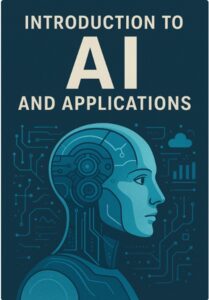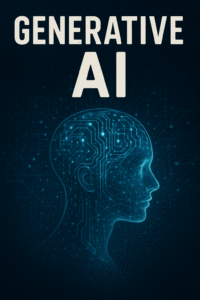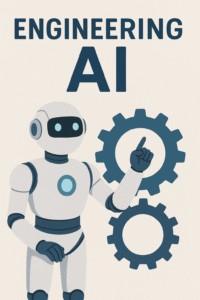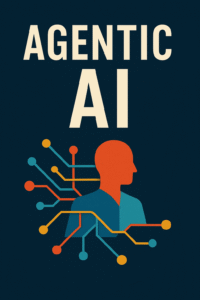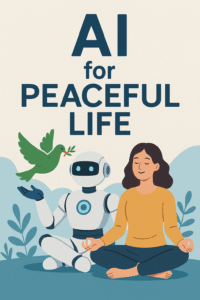Introduction:
In an era dominated by technological advancements, artificial intelligence (AI) has emerged as a powerful force shaping various aspects of our lives. While its impact is undeniable, there is a growing recognition of the need to harness AI for the betterment of our mental well-being. This article explores the role of artificial intelligence in promoting a peaceful mind, emphasizing the positive contributions it can make to mental health and overall serenity.
Stress Reduction through Personal Assistants:
Artificial intelligence-driven personal assistants, such as Siri, Alexa, and Google Assistant, have become ubiquitous in our daily lives. These virtual helpers can simplify tasks, manage schedules, and provide timely information, reducing the cognitive load on individuals. By automating mundane and repetitive activities, AI personal assistants allow us to focus on more meaningful aspects of life, contributing to a sense of calm and reduced stress.
Mental Health Apps and Chatbots:
The rise of mental health applications powered by AI has revolutionized the way we approach emotional well-being. Chatbots equipped with natural language processing capabilities can engage in conversations, offering support and guidance to individuals experiencing stress, anxiety, or depression. These apps provide a convenient and accessible means for seeking assistance, fostering a sense of comfort and reassurance.
Predictive Analytics for Preventive Care:
Artificial intelligence excels in analyzing vast amounts of data, and this capability is increasingly being utilized in healthcare for predictive analytics. By identifying patterns and risk factors, AI can help anticipate potential mental health issues and provide proactive interventions. This preventive approach empowers individuals to take proactive steps in maintaining their mental well-being, contributing to a more peaceful state of mind.
Personalized Meditation and Relaxation:
AI has also made its way into the realm of mindfulness and meditation. Advanced algorithms can tailor meditation and relaxation experiences to an individual’s specific needs and preferences. Whether through meditation apps, virtual reality experiences, or AI-generated ambient sounds, technology can facilitate personalized practices that promote relaxation and mental clarity.
AI-powered meditation apps analyze user preferences, stress levels, and responses to different techniques. They then curate personalized meditation sessions, guiding individuals through practices tailored to their specific needs, ultimately promoting relaxation and peace of mind.
Virtual Therapists and Counseling:
The shortage of mental health professionals worldwide has prompted the exploration of AI-driven virtual therapists and counseling services. These digital platforms can offer support, guidance, and even therapeutic interventions for those in need. While not a replacement for human interaction, these tools can bridge gaps in accessibility and provide a valuable resource for maintaining mental well-being.
Emotion Recognition for Mental Health:
AI’s ability to analyze facial expressions and voice tones can be employed for emotion recognition. This technology can assist individuals and healthcare professionals in identifying emotional states, providing valuable insights for personalized mental health interventions.
Stress Prediction and Management:
Predictive analytics powered by AI can assess patterns in behavior, sleep, and other physiological indicators to predict periods of increased stress. Individuals can then proactively manage stress through recommended activities or interventions, contributing to a more peaceful daily life.
AI-Enhanced Virtual Reality Therapy:
Virtual reality (VR) coupled with AI can create immersive therapeutic environments. These environments can be customized to address specific fears, phobias, or stressors, providing a controlled and supportive space for individuals to confront and overcome mental health challenges.
Cognitive Behavioral Therapy Chatbots:
AI-driven chatbots equipped with cognitive behavioral therapy (CBT) principles can engage in conversations with users to provide support and guidance. These digital companions can assist individuals in challenging and reframing negative thought patterns, fostering a more positive and peaceful mindset.
Personalized Sleep Assistance:
AI algorithms can analyze sleep patterns, environmental factors, and lifestyle choices to offer personalized recommendations for better sleep hygiene. Improved sleep quality can have a profound impact on mental well-being, promoting a sense of calm and balance.
AI-Enhanced Music Therapy
AI can analyze individual preferences, mood indicators, and physiological responses to curate personalized playlists for therapeutic purposes. Music tailored to an individual’s emotional state can serve as a powerful tool for relaxation and stress reduction.
Virtual Support Groups and Communities
AI can facilitate the creation of virtual support groups and online communities where individuals facing similar challenges can connect. These digital spaces provide a platform for sharing experiences, advice, and coping strategies, fostering a sense of understanding and community.
AI-Infused Art and Creativity Apps:
Creativity is a powerful outlet for emotional expression. AI can enhance art and creativity apps by providing suggestions, collaborating with users, or even generating unique artistic content based on an individual’s emotional state, offering a therapeutic and peaceful creative experience.
Real-Time Mood Monitoring:
Wearable devices and smartphone applications equipped with AI can continuously monitor physiological indicators and user interactions to assess mood fluctuations. Real-time insights enable individuals to make informed decisions about their activities and lifestyle, promoting emotional balance and peace of mind.
Conclusion:
Artificial intelligence has the potential to play a transformative role in fostering a peaceful mind in our fast-paced and technologically driven world. By leveraging AI for stress reduction, personalized mental health support, preventive care, relaxation experiences, we can harness the power of technology to enhance our overall well-being. As we continue to explore the intersection of AI and mental health, it is crucial to ensure ethical considerations, data privacy, and responsible deployment to maximize the positive impact of artificial intelligence on our collective peace of mind.
Artificial intelligence, when wielded responsibly, has the potential to be a significant ally in the quest for a peaceful mind. These use cases demonstrate the diverse ways in which AI can contribute to mental well-being, offering personalized support, predictive insights, and innovative therapeutic experiences. As we navigate the evolving landscape of technology and mental health, it is crucial to embrace these positive applications of AI while remaining vigilant about ethical considerations and user privacy.




